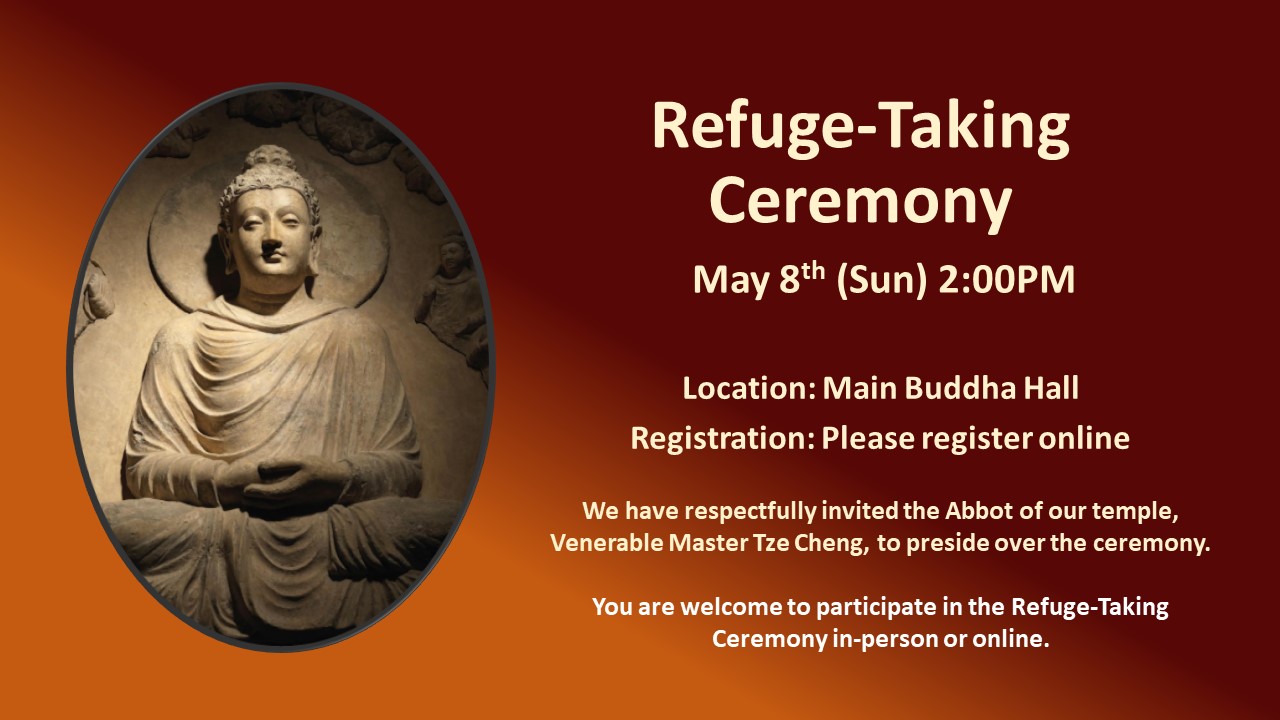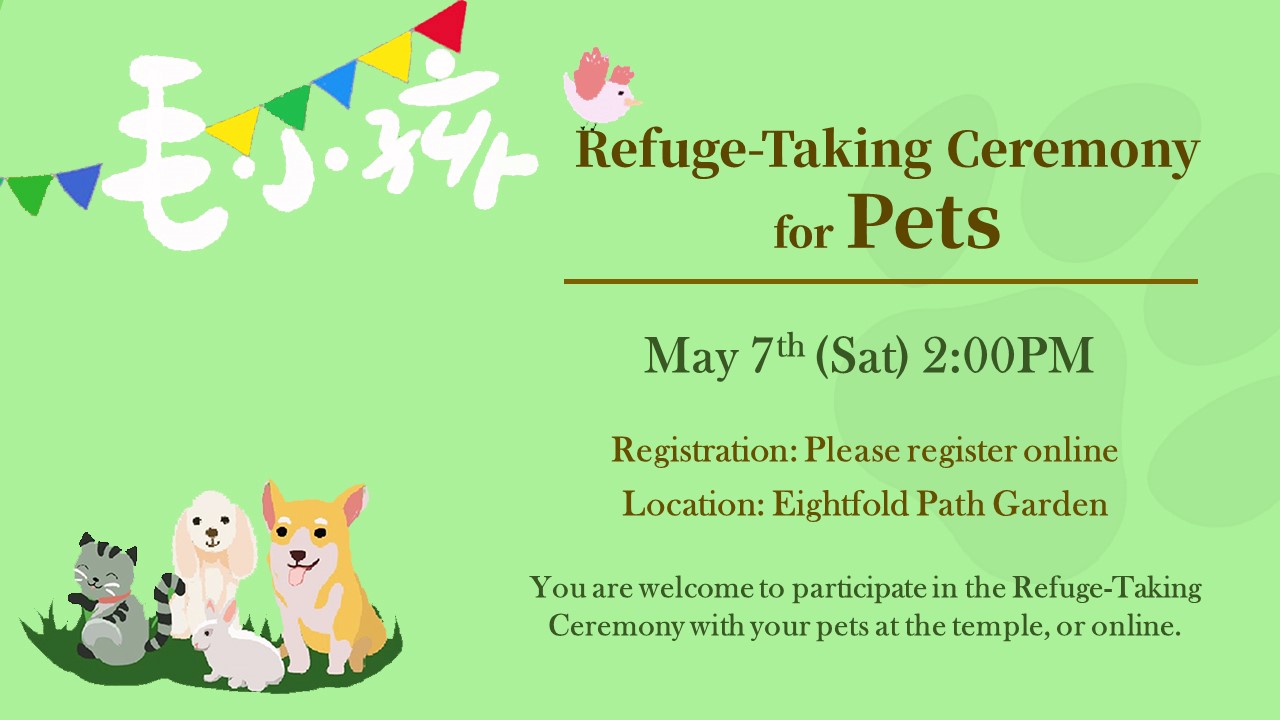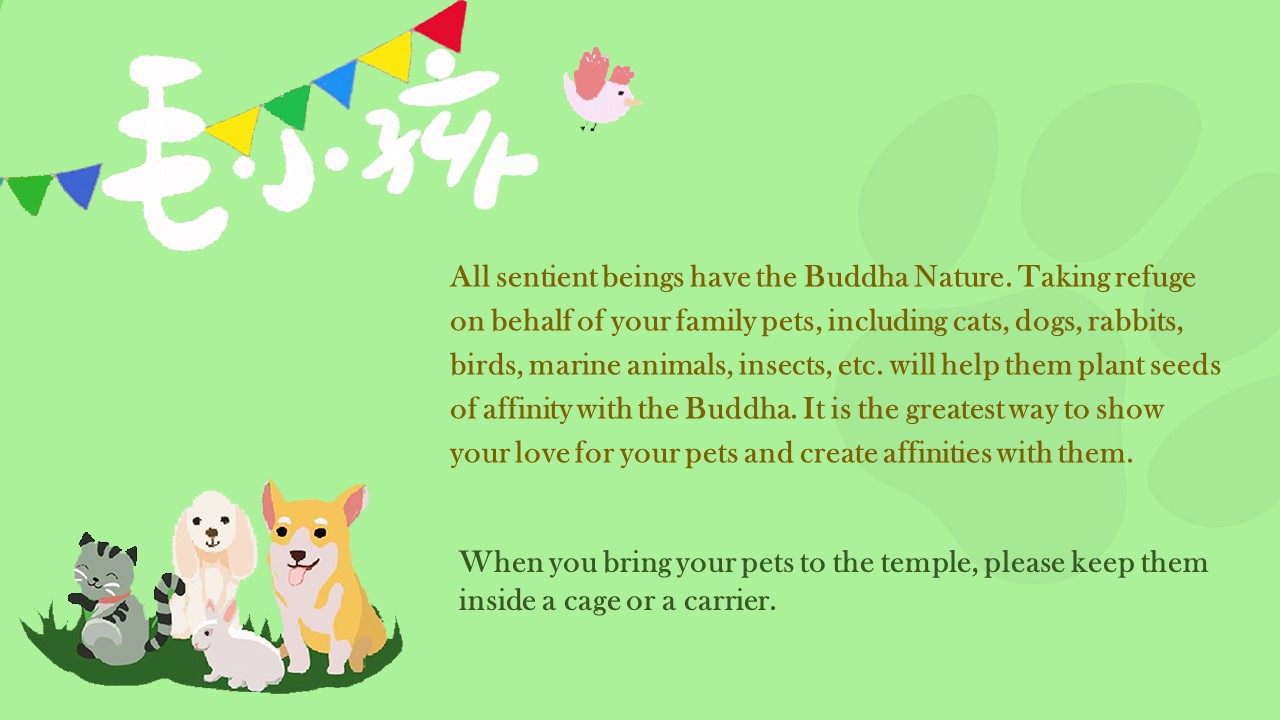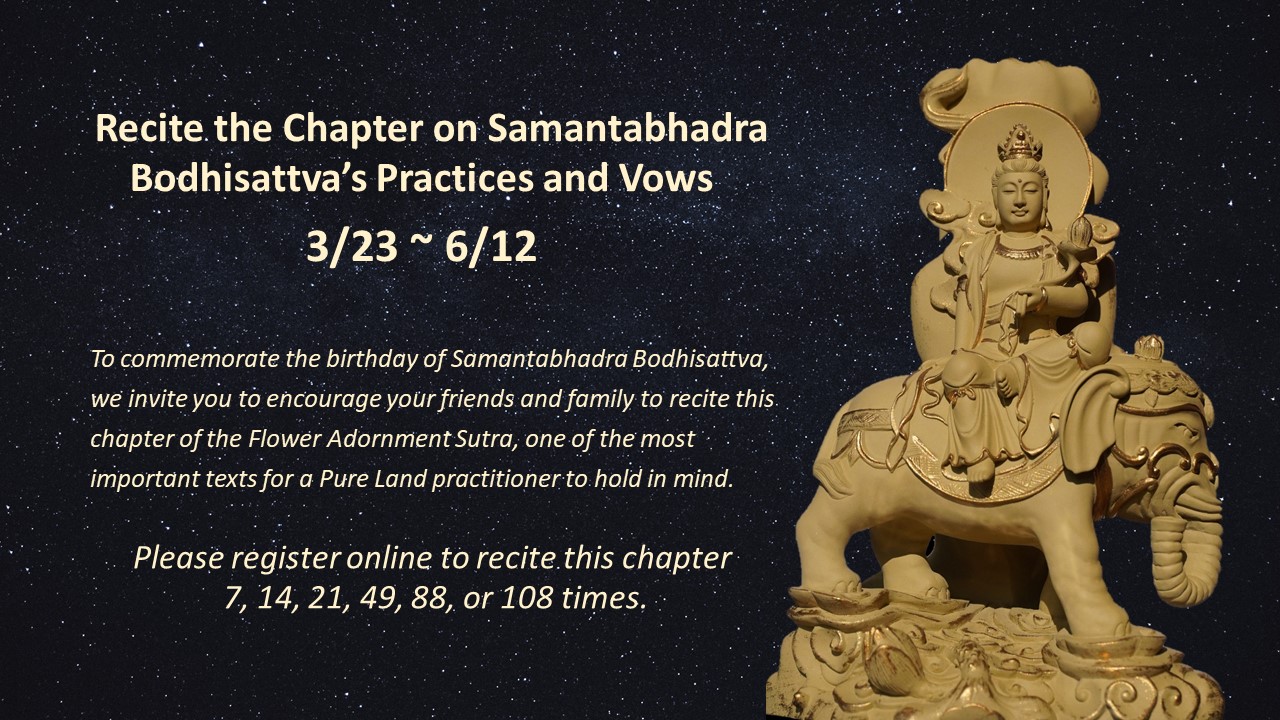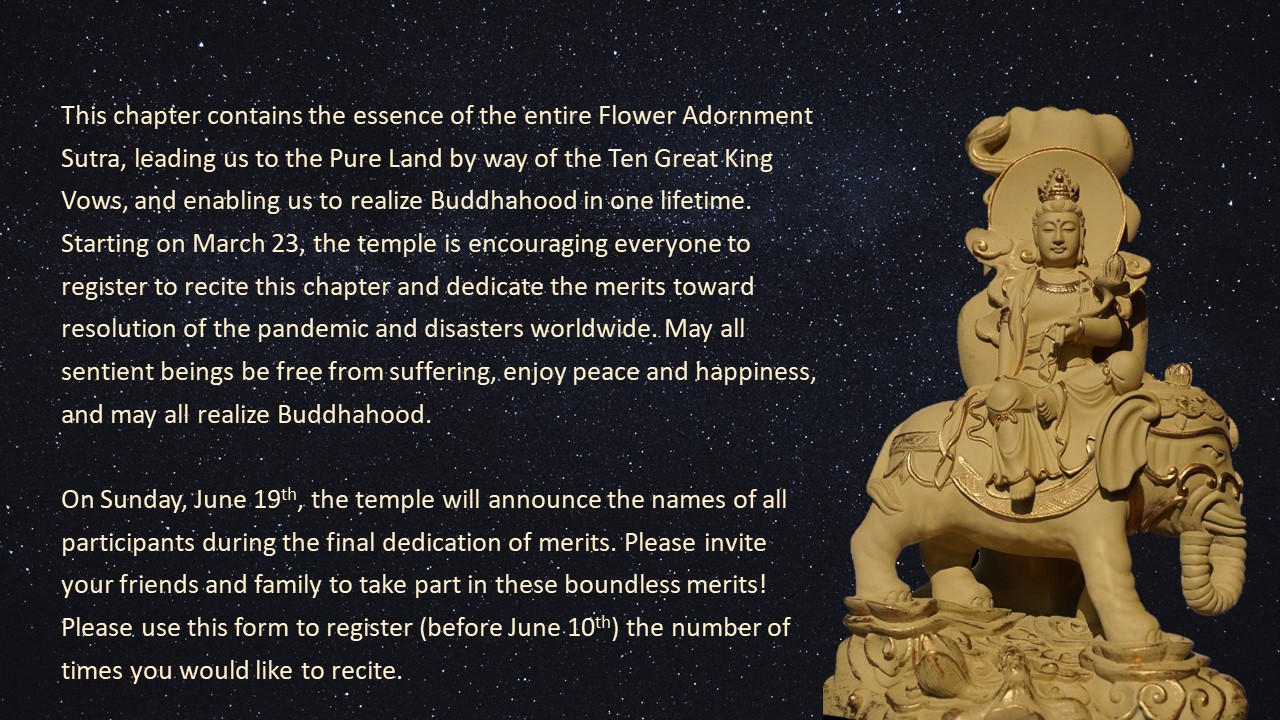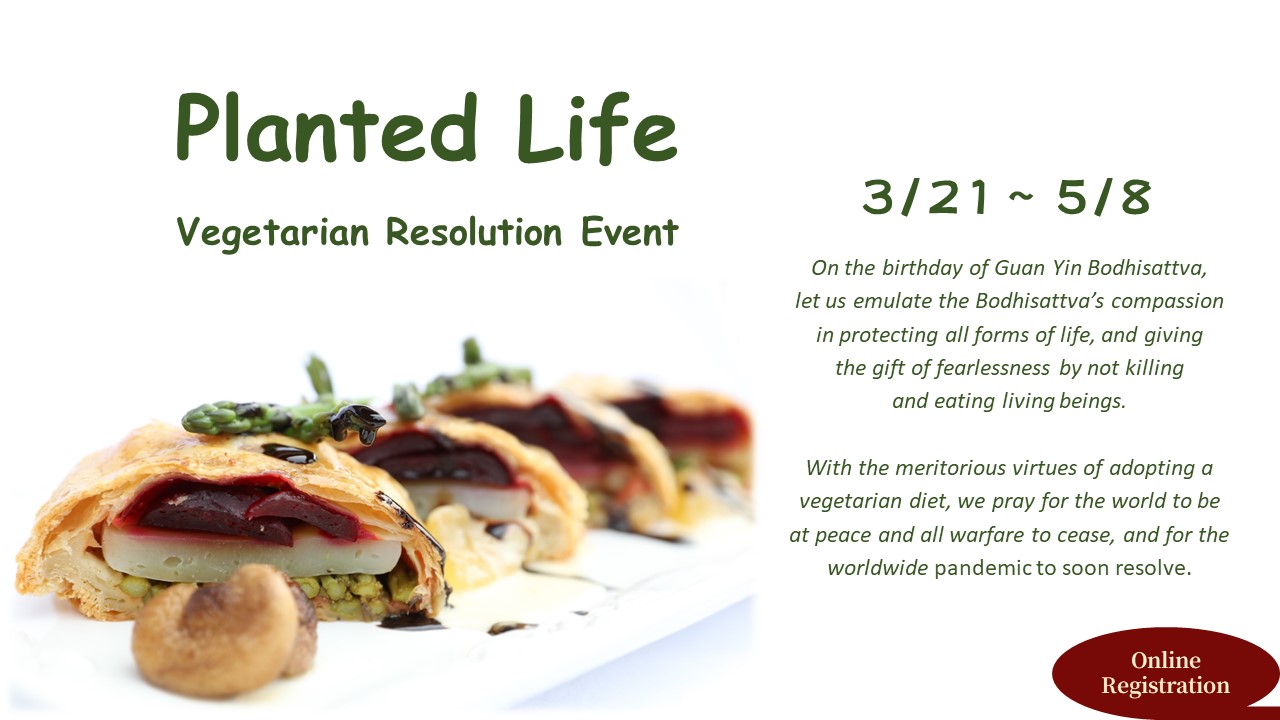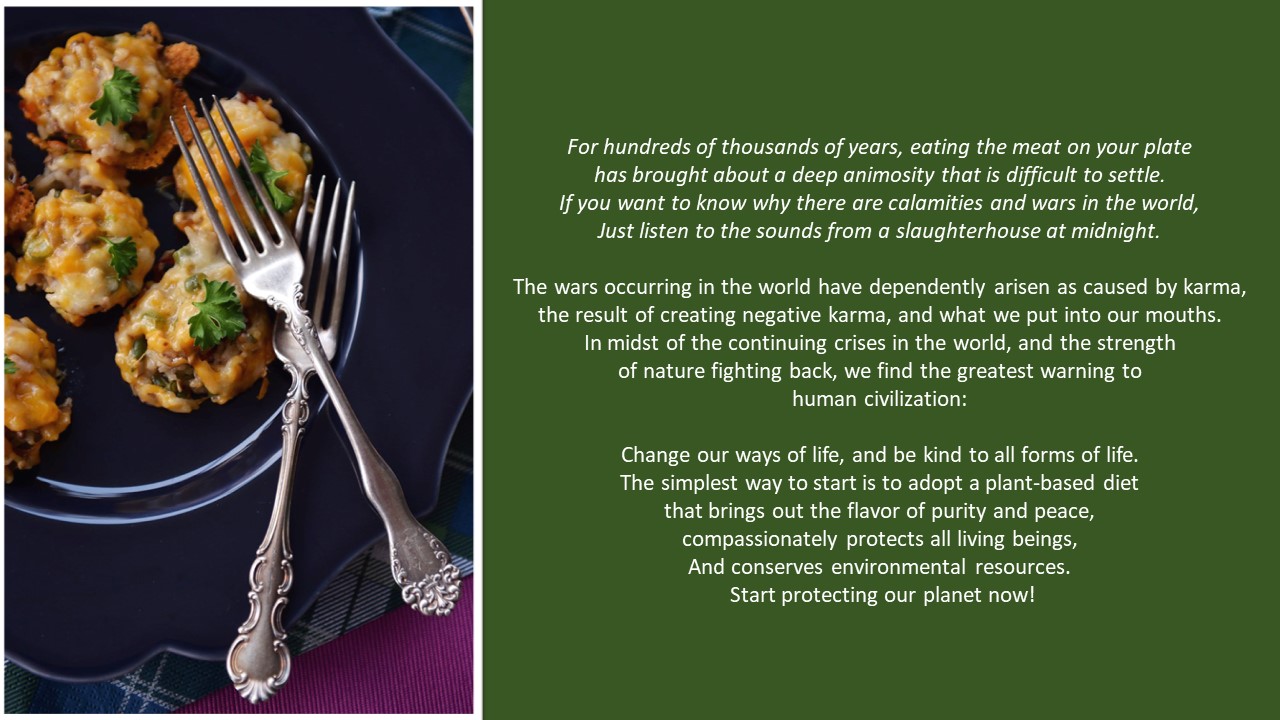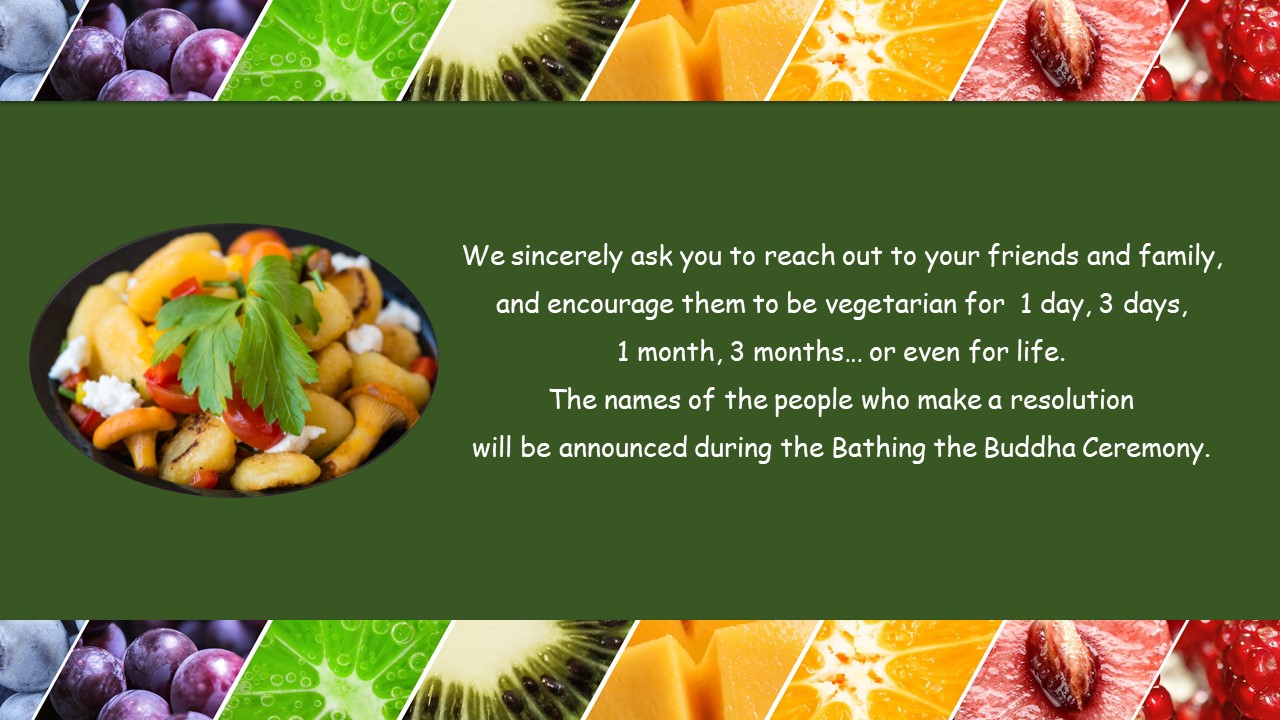-
Date:
-
Descriptions:
Reciting the Amitabha Sutra (English Version) & Buddha’s name
-
Calendar:
-
Location:Recitation Hall, 10060 No. 5 Road, Richmond BC V7A 4E5 View Map
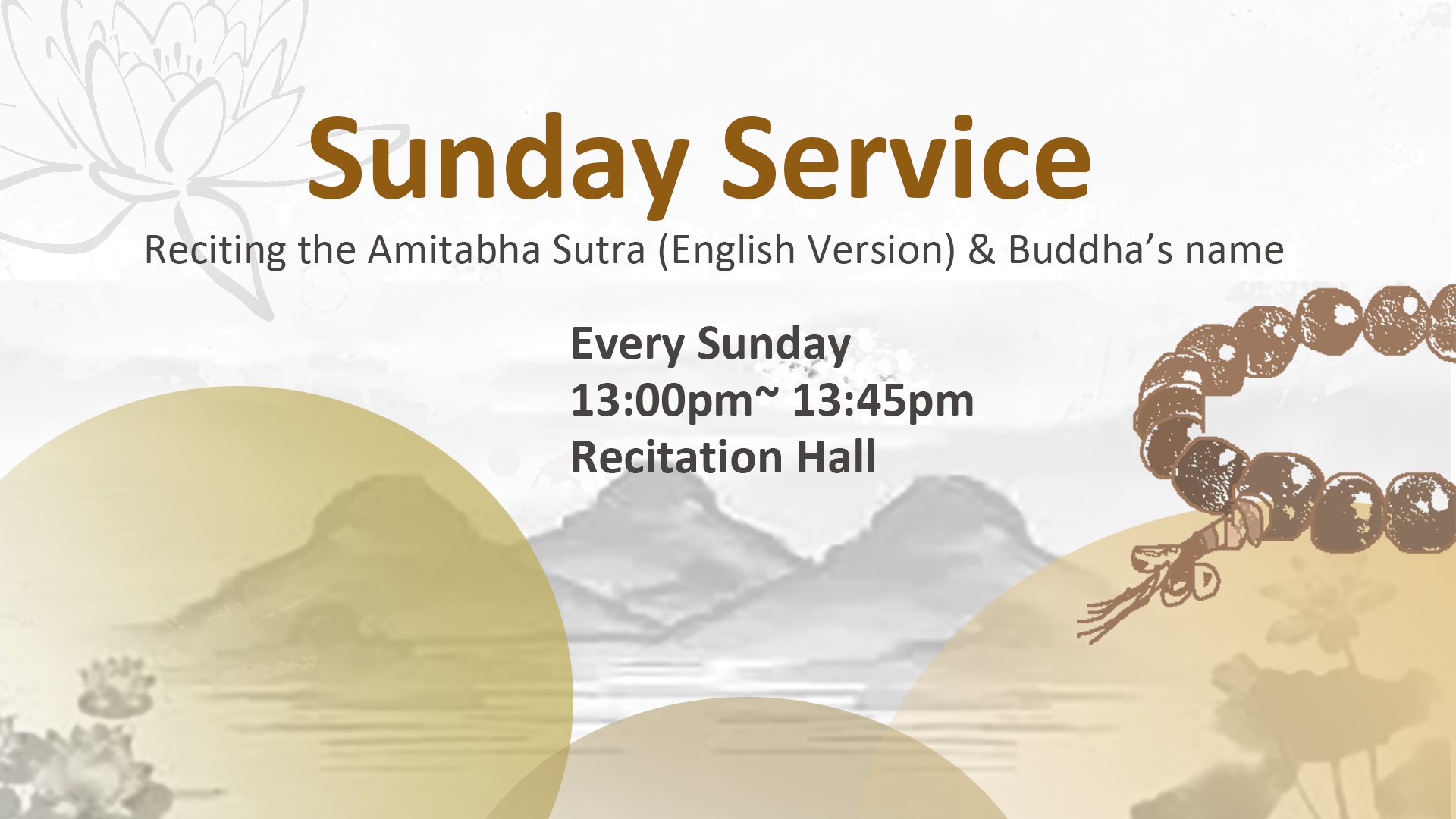
Reciting the Amitabha Sutra (English Version) & Buddha’s name


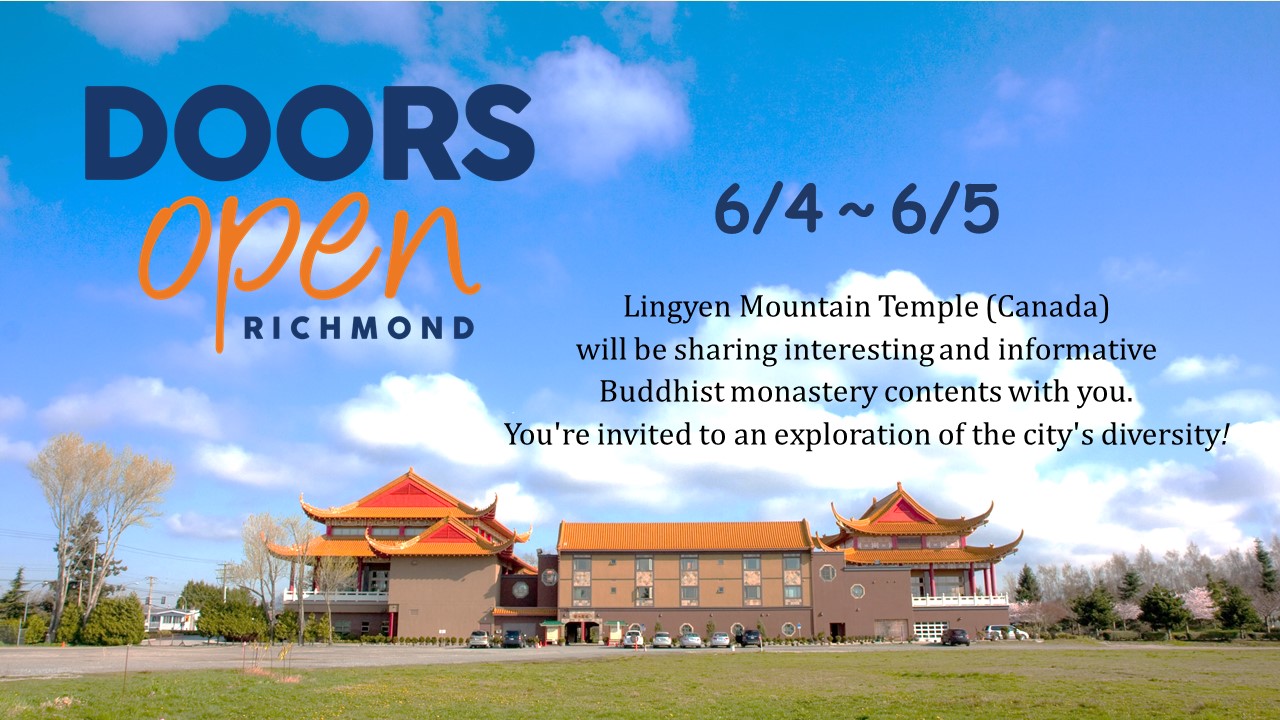
The eighth day of the fourth month on the lunar calendar is the day we commemorate the birth of Shakyamuni Buddha, the compassionate teachings of whom are like a boat that can guide us to safety in the sea of suffering. As disciples of the Buddha, we commemorate his birth on this special day every year to repay our debt of gratitude.
It is said that when the Buddha was born in India, nine celestial dragons rained fragrant water from the sky to bathe the Prince Siddhartha. According to the Sutra on Bathing the Statues of a Buddha, “Good men and good women, after the passing of the Buddha, you should be wholeheartedly mindful of the power of his boundless meritorious virtues. Bathe the Buddha statue as if the Buddha was here in this world. By doing so, you will receive countless blessings.”
The Merits of Bathing the Buddha Sutra states that if people, with pure intentions, offer incense, flowers, necklaces of precious stones, banners, canopies, and robes before the Buddha statue, and use the most superior fragrant water to bathe the Buddha, light incense and visualize the incense permeating the Dharma Realm, make offerings of food, drum music and singing with stringed instruments in praise of the Buddha, and dedicate these merits to attaining the perfect wisdom of a Buddha, then these people will receive boundless blessings and virtues, and their wisdom will continuously increase. The blessings and virtues generated from bathing the Buddha are the most extraordinary of all forms of offerings. They exceed the merits from making as many offerings of the seven treasures as the sands in the Ganges River.
For this reason, every year on this special day, the temple sets up a gazebo with flowers, fragrant water, and statues of the baby Buddha. As we bathe the statues, we will recite the Verse of Bathing the Buddha in praise of the Buddha’s merits and virtues. Today, let us also make a vow to attain the perfect wisdom of a Buddha. Bathing the Buddha is especially auspicious, as it can bring immeasurable blessings, virtues, and wisdom.
By bathing the Buddha with fragrant water, we will bring forth our wisdom and compassion, and purify our Three Karma: our body, mouth and mind. At the sight of the pure and innocent baby Buddha, our mind will immediately return to its most genuine, original state. We hope to realize where we came from before we came into this world, and restore our pure and undefiled Buddha nature.
Bathing the Buddha generates seven kinds of blessings:
The Buddha said, “Those who can sincerely bathe the statue of a Buddha, as if the Buddha was present, will have all of their wishes fulfilled.”
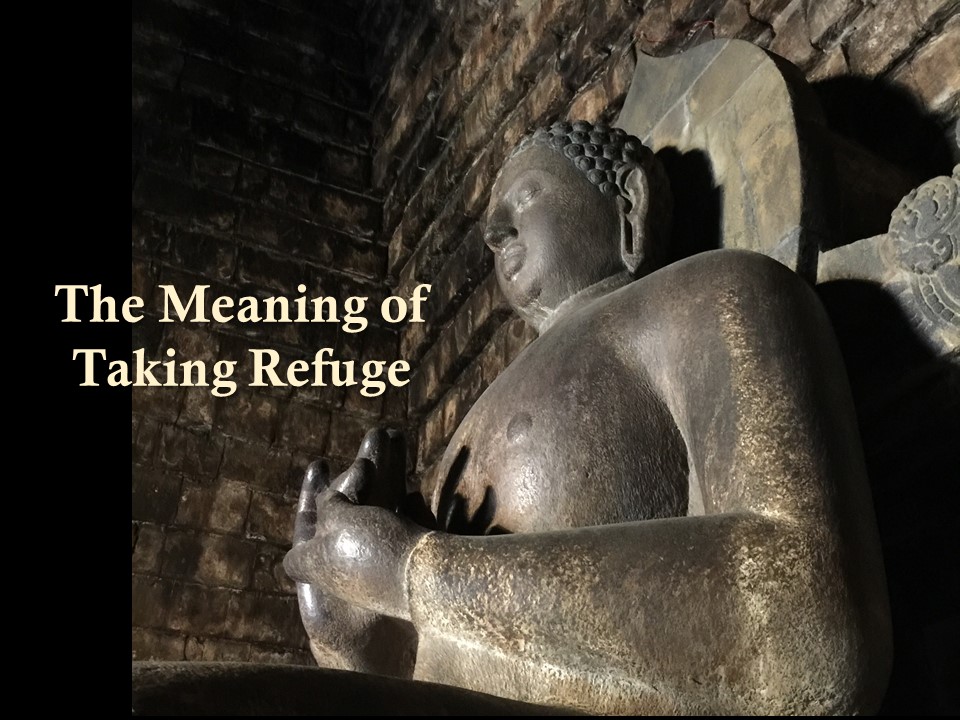
Why should we take refuge in the Three Treasures? What are the benefits of doing so? What does “Taking Refuge” entail? What do the Three Treasures represent? But, what are the Three Treasures? They are the Buddha, the Dharma, and the Sangha. The Three Treasures are what we are taking refuge in. Why are they considered “Treasures”? Because the word “Treasure” embodies the meanings of nobility, illumination, and purity.
Taking refuge in the Buddha means taking refuge in Shakyamuni Buddha and in the Buddhas of all Ten Directions. A Buddha is the teacher of all beings in the human and heavenly realms and is the World Honored One in the Three Realms. Taking refuge helps eliminate our karmic hindrances and enhances our blessings and wisdom; isn’t that an unsurpassed treasure? Buddhas refrain from unwholesome deeds and obtain the pure virtue of having severed all secular afflictions; isn’t that purity? We take refuge in the Buddha to learn from him; should we not learn from such a truly wise advisor?

We take refuge in the Dharma—which is the truth. What is the truth? The Law of Cause and Effect! You will reap wholesome fruits if you cultivate wholesome deeds; however, if you commit unwholesome deeds, you will suffer the corresponding retribution. This is guaranteed! Will positive reward derive from wrongful deeds? Will you suffer retribution when you do good deeds? That is impossible! You may think, “Some honest and hardworking individuals seem to lead very hard lives; and others that perform bad deeds seem to live carefree. How is this fair?” Taking refuge in the Dharma requires you to seek understanding in the truth; the truth about the Law of Cause and Effect is that it spans through Three Periods (past, present, and future). When only looking at the present, many situations are inexplicable. Why would virtuous people live a difficult life? It is because of negative karma accumulated in past lives, which is no different from the results a person gets from having done good deeds today after having performed bad ones yesterday. How about wicked people who are able to live carefree today? They owe it to virtuous deeds they performed in past lives, just like someone who behaves badly today but behaved well yesterday.
No one is completely wicked or completely virtuous in this world. Even good people have some negative karma and, therefore, must pay their dues. Correspondingly, some misbehaved individuals have good karma and experience rewards. Isn’t this fair and non-discriminatory? We need to have a good understanding of the truth. If we confine our vision only to the present life, we would expect someone with good works in this life and with many offenses in their past lives to be rewarded. One can cultivate good deeds now for future enjoyment, just as farmers sow seeds in the spring and harvest in the autumn. This is the austere truth of Cause and Effect.
Taking refuge in the Dharma is taking refuge in the teachings of the Buddha, which is the truth. When you understand the truth, you will no longer engage in bad behavior even when instructed to break the rules! Even if you have the capability of committing bad deeds; you will not have the audacity to do so. You will instinctively perform good deeds even when encouraged otherwise. Only by cultivating virtues can we obtain peacefulness and joy. Hence the importance of taking refuge in the Dharma.

In Shakyamuni Buddha’s time, there were twelve hundred and fifty Bhikshus accompanying the Buddha in spreading the Dharma. We are currently in the Dharma-Ending Age; Shakyamuni Buddha has entered Nirvana and Maitreya Bodhisattva has yet to descend into the Saha World to attain Buddhahood. Since we cannot hear the teachings directly from the Buddha, we must completely rely on the Sangha Treasure. The Sangha are able to preach the Buddhadharma on behalf of the Buddha. Because the general public honors and respects them, we must take refuge in the Sangha.
Naturally, we do not want our bodies to suffer. But where do these suffering come from? They come from the mind! Because we lack wisdom, our mind constantly creates suffering. Our mind is ill, and the Buddha is like a great doctor who treats our ailments, just as medical doctors prescribe the right medication to heal our specific ailments; Shakyamuni Buddha teaches the truth of Cause and Effect to help us eliminate evil and to cultivate goodness. The Dharma is the medicine and the Sangha is the nurse giving us instructions on how to apply the medication. They also give us teaching and guidance. The Sangha are representatives of the Buddha, in that they share his unsurpassed “medical advice” with us. We should, therefore, take refuge in the Sangha.
Once you have taken refuge you will be a disciple of the Three Treasures. Your next step will be to diligently cultivate good deeds in all areas of your life. Cultivating good deeds is similar to taking medicine to help our bodies remain healthy and strong. We also need to renounce all bad deeds, which is similar to abstaining from foods that interfere with our medication. If we fail to abstain, even if we take the best medication, we will be unable to recover from illness. When we produce a combination of good and bad deeds, our negative karma pollutes our good karma, making it impossible for us to enjoy our blessings in peace. Consider this: everyone enjoys delicious food; but if the dinnerware is unclean, how could it be healthy to consume the food? You might even get food poisoning! Those who have practiced goodness after taking refuge but have not received the expected results might say, “I have done good deeds, but why have the Bodhisattvas not blessed me?” It is because your virtues are impure; they are contaminated with bad karma. You must remember the saying, “Do not engage in anything unwholesome; instead, try your best to do all kinds of good.” Disciples of the Three Treasures should adhere to this practice, for doing so will allow them to enjoy happiness and to be free from the suffering brought on by retribution.

What we have discussed above are the intrinsic merits of the Three Treasures. Then what does “taking refuge” mean? It means finding a sanctuary or having a homecoming. Think of it as a child who does not listen to his parents, runs away from home, loiters in the community or even joins criminal gangs. It is also like a student who ignores his teachers’ warnings, skips classes, and wastes time playing during school hours. How pitiful he is! But eventually, he may come across a lot of hardships and in those times, he will think, “How nice would it be to be home! I have everything I need there and my parents love me so much. The teachers and classmates in my school are nice too! Why did I let myself be bullied and dragged into gangs?” Once the child has had enough suffering, he will be awakened and he will return home and continue his education.
Much like a big dye-pot, our society is turbid, and living in such an environment each person is influenced by one another. Once you step into society, you must either flow with the current or be rejected. There are more people in the world with troubled minds than peaceful, mentally healthy ones. It is said, “One who touches tar knows the dullness of black; one who touches vermillion knows the brilliance of red.” Once you are integrated into a group, you will inevitably be influenced by your surroundings; it is that simple. Once we become awakened, however, our instinct is to leave the group and go home. But, where is home? Well, it is said, “The mind is the Buddha, and the Buddha is the mind.” Currently, even as ordinary people, we still have the innate nature of the Buddha, and that Buddha nature is where we ultimately belong. The home provided by your parents is one derived from secular sentiments and delusions. How can it provide you with true happiness and a refuge? Your parents’ home is not your final destination! Now that you have heard the truth and are returning to your Buddha nature, you have found a permanent sanctuary in Buddhism.
People often condemn a defiant child as a burden to society. However, the child’s parents, like most parents, would never consider their child to be truly bad. Regardless of how you behave, your mom and dad will always want you to return home. The Buddha’s compassion is immeasurably greater than that of your parents. Regardless of the amount of negative karma accumulated, once you repent, the Buddha will not forsake you. Returning to your Buddha nature is like being a vagrant child who returns home to good, loving parents; good parents always embrace their offspring, take good care of them, and overlook all of their past wrongdoings. This is how parents care for their children and how Buddhas care for all sentient beings. As long as we return to the Buddhadharma and lead a life in accordance with the Buddha’s teachings, we will have all that to rely on. This is what “taking refuge” means. Do you still think it is superstitious?
The ignorant often say, “Being kind-hearted is good enough!” They aloofly proclaim, “I hold no belief in anything other than myself!” But do their actions measure up to their words? Of course we need to be kind-hearted human beings, this is a basic requirement. But our actions need to match our ideals, and one actually has to perform good deeds to be considered a good person. If you claim to be kind-hearted but fail to perform wholesome deeds, are you actually a good person? Then would you, a so called “good person,” benefit others with your actions?
Once we understand the correct principles, we should teach these principles to the ignorant, to make them feel ashamed of their actions; otherwise, they will continue to look down upon Buddhist practitioners, claiming that Buddhism is superstitious nonsense. We need to understand and remember these principles, so that in addition to ourselves taking refuge in the Three Treasures, we will guide others to take refuge as well. As we practice, we also encourage others to practice. When our purpose is to attain Buddhahood, it is natural for us to wish that everyone else will attain Buddhahood as well! This is what it means to take refuge in the Three Treasures.

If people take refuge in the Three Treasures, they obtain endless blessings. More importantly, it is a starting point which leads them toward the ultimate joy of tranquility and Nirvana. To summarize, there are nine benefits of taking refuge in the Three Treasures. By taking refuge, they become disciples of the Buddha; it also builds a foundation for them to take the precepts in the future. Taking refuge also reduces their karmic obstacles, and allows them to accumulate vast and extensive blessings and virtues. They will not fall into the lower realms of rebirth, and will not be disturbed by humans or non-humans. They will be protected by 36 virtuous deities at all times, and will succeed in all of their virtuous endeavors. Finally, they will be able to realize Buddhahood.
There is a story in the Buddhist sutras about a heavenly being in the Heaven of the Thirty-three Gods, who used up all his heavenly blessings and was going to die in seven days. He no longer felt the same happiness as he did in the past, and the beautiful heavenly maidens left him. His originally mighty appearance was now devoid of any signs of health and energy. His body was weak, and dirty. Foul-smelling sweat continually dripped from his armpits all day long. He observed that he was going to be reborn as a pig, and lay down on the floor crying and complaining. The heavenly Lord heard about this, and instructed him to sincerely take refuge in the Three Treasures. He taught him to recite this verse: “Taking refuge in the Buddha, one will be supreme among two-legged beings; taking refuge in the Dharma, one will be detached from desires; taking refuge in the Sangha, one will be outstanding among sentient beings.” He followed the heavenly Lord’s instructions and took refuge in the Three Treasures. After seven days, he died. The heavenly Lord wanted to know where he was reborn, but even with his abilities, he was unable to find him. To find out, he had to ask the Buddha. The Buddha said, “Because of the merit and virtue he gained from taking refuge in the Three Treasures, he has already ascended to the Tusita Heaven. As heavenly beings, you can only see what is below you; you cannot see what is above.”

Having taken refuge in the Three Treasures, you should also stay close to them, and practice in accordance with their teachings from now on. How do we do that? There are Four Grand Vows to guide you, if you walk your Bodhi path and diligently abide by these vows, you will not go wrong.
“Living beings are countless; I vow to deliver them all!” Do not be daunted by the innumerable sentient beings in need of liberation; you may ask, “How are we going to enlighten them all?” Not to worry! You do not have to save them all in one day. Whomever you are unable to save in your present life, you can save in your next one! Do it one person at a time. How difficult can this be? It is just like climbing a pagoda: you cannot reach the top in one step. There are stairs inside to allow you to ascend step by step. We start with our parents, our siblings, and our children. We especially need to educate our children well. If we fail to teach them well, they may end up harming society when they grow up. As the saying goes, “It is the parents’ fault when children are raised without instruction.” Buddhists should form families where Buddhist principles are taught to every family member, so that when one person learns Buddhism, he or she can lead the entire family to find happiness; and when every person in the world finds Buddhism, the whole earth will be peaceful and law enforcement will no longer be required.
“Afflictions are inexhaustible; I vow to eliminate them all!” Which are the afflictions that humans need to be delivered from? They consist of unhealthy lifestyles and bad habits; we have to terminate these negative causes. When it comes to disputes or controversies, it is said, “compromise will make a conflict easier to resolve.” If you insist on debating all matters of who is right or wrong, are you not creating afflictions for yourself? Rather, you should be patient and tolerant in all matters; in so doing, you will cultivate great virtues. Some people are unable to be tolerant and patient even with their parents and children. Why create problems and distress in your own family? Whom does that benefit? It takes a lot of affinity from the past to become members of a family, and everyone should cherish these relationships and have only love for one another. Why end up as enemies? Since you are now a Buddhist, you should change your temperament, and if it hasn’t been the case so far, start by being good to your parents, showing compassion to your children, and treating your in-laws as if they were your own parents and children. Then you will naturally have a good family. Change your lifestyle and habits and stop creating afflictions!
“The Dharma teachings are boundless; I vow to practice them all.” What do we vow to practice? We vow to practice good deeds and to abstain from anything unwholesome. There are methods we can follow so we will perform only good deeds, stopping ourselves from carrying out the wrong ones; however, following these methods requires dedication and perseverance. When you have perfected these Dharma teachings and have fulfilled your merits and virtues, you will become a Buddha. But it isn’t easy.
“Buddhahood is unsurpassed, I vow to attain it.” Why is it difficult to attain Buddhahood? Difficulties arise when you fail to follow the methods that lead you to terminate unwholesome acts and to perform only good deeds, hindering you from attaining Buddhahood. We are all Buddhas by nature. Take a piece of wood for example. The representation of a Buddha will not appear unless a sculptor chisels an image of a Buddha out of the wood. Otherwise, it will stay as an ordinary piece of wood, lacking the necessary qualifications to receive others’ respect and homage. You should all respect, love, and support yourselves. Be a good person, and practice the Buddhadharma with dedication. This is the path to Buddhahood!
